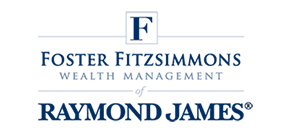INVESTING TENETS WE LIVE BY
At Foster Fitzsimmons Wealth Management Group of Raymond James, our comprehensive approach is based on several core investment philosophies designed to help maximize your return while controlling risk. We believe the best investment strategy is one that aligns with your overall financial plan, and our philosophy closely integrates your personal goals with your investment portfolio.
INSIGHTS ON PORTFOLIO MANAGEMENT
- Determining the optimal mix of asset classes to include in your portfolio is an important decision that we can help you make. Accordingly, this decision is at the center of our investment process.
- Lifestyle decisions can be just as important as asset allocation decisions. When to retire, how much to save, legacy goals and other choices can have a significant impact on your plan’s likelihood of success.
- We believe effective portfolio strategy utilizes broad, global diversification as a method of potentially maximizing returns and increasing long-term performance.
- Minimizing investment costs and taxes is critical to helping increase long-term performance…you will keep more if you spend less.
THOUGHTS ON THE MARKET AND YOUR PORTFOLIO
- Since most markets are very efficient, it’s extremely difficult to consistently outperform them. That’s why cost-efficient and index investment vehicles form the cornerstone of our portfolio strategy.
- We believe it isn’t possible to consistently predict or time the markets. Such activity merely adds speculative risk, excessive costs and needless taxes.
- Remember, risk and return are related. If you require higher returns, you must be able to tolerate higher risks and vice versa.
There is no assurance that any investment strategy will be successful. Investments are subject to market risk, including possible loss of principal. Asset allocation and diversification do not ensure a profit or protect against a loss. International investing involves additional risks such as currency fluctuations, differing financial accounting standards, and possible political and economic instability. These risks are greater in emerging markets.

